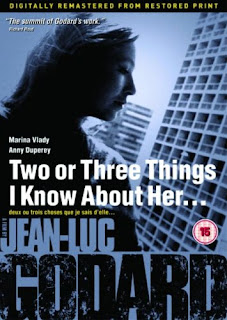Stanley Kubrick's ground breaking science-fiction groundbreaker is next on the list. It's a long, winding, epic film which is essentially about evolution. It's opening act based during the origins of mankind, the final act ending in a possible next stage of evolution. How we get there is quite an odd journey.
So we start at the dawn of man where prehistoric pimates encounter a myterious black monolith which then triggers them to stop being placcid vegetarians, pick up bones and wield them as weapons. Cue bloodshed and rare steak. A seminal shot of a bone being flung into the air cuts to the future and a satellite/spaceship orbiting the earth and dancing a waltz to The Blue Danube, whilst docking into a space station. Here we meet up with scientists off to an excavation on the moon's surface where a mysterious black monolith has been found buried. As they approach it gives off a high frequency signal. Jump to 18 months later and a spaceship heading towards jupiter on a mysterious mission. Manned by Dave and Frank, with unseen scientists in stasis, the mission is sabotaged by paranoid computer Hal. Sole survivor Dave makes it though to jupiter to discover, yup, a mysterious black monolith floating in space. Cue trippy moments of Dave aging, dying in a hotel suite and then reborn through a gateway into a new stage as a 'star-child' All a bit bonkers!
The film is a big trip, but it's amazingly well thought out. It's surrounded by science fact. The look of space, the design of the craft inside and out, the technology is all highly accurate as the designers and writers worked closely with NASA. Kubrick even predicts skyping! The dawn of man act shows off some impressive make-up worn by actors/dancers who were well studied in the movements of primates. Nothing is done haphazardly.
The star of the film is the disturbed computer HAL, voiced by Douglas Rain. As the 2 concious scientists go about their days in a methodical way, it is HAL who is becoming more human, asking opinion and commenting on Dave's sketchings. This comes to a head when he discovers a plot to decommision him and survival becomes his mission. He does seem to go about it rather clunkily though. There must have been an easier way of doing them all in.
The final act is the biggest head-fuck and I still couldn't tell you what all that was about.
There are many things to enjoy about this film. It is true spectacle to watch and the soundtrack is superb. It takes a great precident in the film as there isn't a great deal of dialogue. The jupiter mission act is the most satisfying and HAL is greatly quoteable.
I'm not sure, as a grand total of it's parts, I would herald it as a great film, but there is no denying it's influence on modern cinema.
This review can serve no purpose anymore. Goodbye.
























